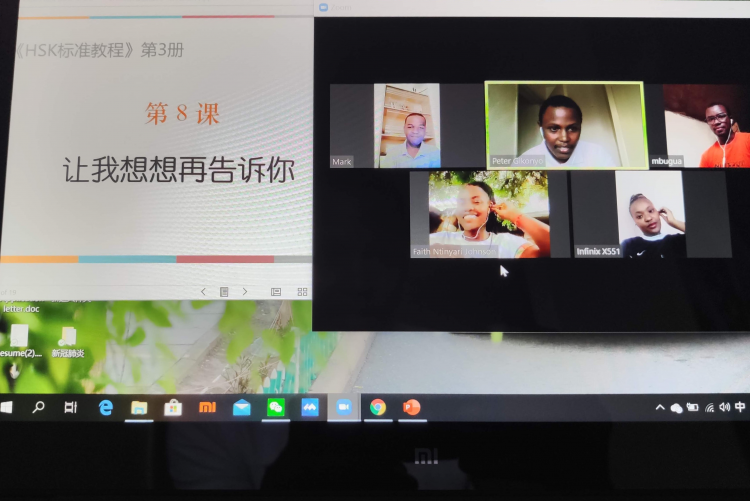Prior to the outbreak of COVID-19 in Kenya, the teaching and learning at the Confucius Institute at the University of Nairobi proceeded uninterruptedly. However, due to the impact of the Coronavirus epidemic, the Kenyan government announced the suspension of education in training institutions nationwide, and the University of Nairobi closed on March 16. Based on the new emerged conditions, the Confucius Institute at the University of Nairobi (CIUON) suspended the classes, but all lectures try their effort to help students learning and adopted emergency teaching plan, online teaching. They transferred face-to-face courses to online courses, whereby teachers and students interact in online classes.
Online teaching is not a simple matter for all teachers, but teachers facing the difficulties, constantly exchange teaching and learning ideas, explore suitable and efficient network platforms, teaching methods, and make every effort to provide students with high-quality Chinese learning lessons. The students also actively participate in classes and cooperated with teachers; this has led to achieving good teaching results.
Chinese teacher Tian Xin, in charge of teaching Chinese literature, said: "After school closed, we use the WhatsApp group to communicate. I send the reading materials (including the content in the book and the content out of the textbook) to the group, and at the same time give the homework to the students. The students submit their homework on time and say that this way of class is immensely helpful to them."

Local teacher of Chinese Language Peter Gikonyo said: "I have conducted research on active and effective online teaching methods, together with my students, we have established WhatsApp groups. At the same time, I adopted the use of Google Classroom to provide online courses where students can take Chinese lessons at home. In addition, I also started to use Zoom, Cisco Webex and Google Meet platforms to ensure one-on-one contact with students. Although, these online platforms have some challenges in actual use, such as unstable network connection, I have taken all measures to help students’ in their Chinese study. Currently we have made major course progress and have covered much of the content for this semester, my students are now fully prepared for the exams. "

Volunteer teacher Wang Chenxi said: "Since the suspension of classes, Zoom has been used for online teaching. Multiple teaching modes and fresh teaching experiences have immersed students in the classroom. Online teaching has been going on for more than a month, in comparison to face-to-face teaching, online teaching can be more effective especially in the use of internet resources and its effect is tremendous. After class, students express that they enjoy this online teaching model very much. "

Ma Shuang, a volunteer teacher in charge of teaching Chinese courses at Huayun School, reported that the convenience of the internet is to allow students to learn from home. By use of the screen sharing, the teacher ’s prepared PPT is used in teaching so that student’s learning cannot be affected during the epidemic. In addition, the volunteer teacher Tian Ning, also a volunteer teacher in charge of Huayun School Chinese courses reported that the function of sharing the screen in the Zoom classroom has made the classroom more convenient and efficient. The students listened carefully and actively answered questions. After the class, the parents responded that the children enjoyed the online Chinese class.


In the wake of the epidemic, the teachers of the Confucius Institute at the University of Nairobi harnessed their efforts to jointly meet the challenges posed by the e-learning and teaching. In the future, teachers will endeavor to make persistent efforts by innovating content and form of online teaching to meet the diverse learning needs of students.
- Log in to post comments

